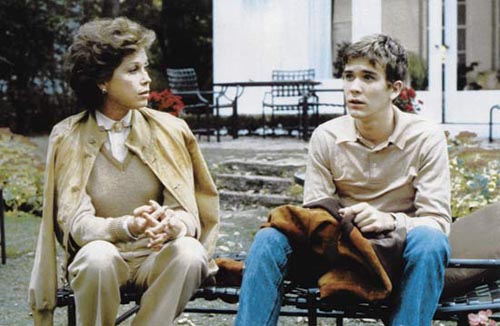“Ordinary People” (1980) – 4.5/5 Stars
With the Oscars now less than 30 days away, I’m dedicating a lot of my archive reviews to some of the big winners. Here’s a film I watched recently, 1981 (1980 calendar year) Best Picture winner Ordinary People.
The way “Ordinary People” depicts the family is tough to swallow. Is the Jarrett family really ordinary? They suffered a horrible loss when their eldest son died in a boating accident and their youngest has recently come home after four months in the hospital because he tried to kill himself. These are not “ordinary” circumstances per say, but these are how once-ordinary people would handle such tragedy — how any of us who can identify with feeling ordinary would handle such tragedy. That’s the beauty of Alvin Sargent’s script, Robert Redford’s sensitive yet powerful direction and humbling performances from a terrific cast.
I personally took to “Ordinary People” more quickly because it takes place and was filmed where I grew up in north-suburban Chicago. Although that personally brought it home more easily, there’s something that everyone can connect with in this film. If nothing else, it addresses family intimacy, which every family has varying degrees of, and it will guaranteed make you think about that from a different perspective or maybe even awaken a greater need for that in your own life.
The Jarretts, Calvin (Sutherland), Beth (Moore) and Conrad (Hutton) appear to be a very pleasant and agreeable family in the beginning, but look closer and you can see the tension. Family discussion is like a formality and Conrad and Beth in particular have a completely shattered relationship. All three actors master the script’s subtext and create believable and complex characters and relationships. Their profiles are so comprehensive in fact that they can’t easily be summarized.
The focus is namely on the Oscar-winning debut of Hutton as Conrad. Hutton inherits one of the most psychologically complex film characters ever and he bottles it all in and somehow it manifests itself into this touching and fragile performance. Conrad has nightmares, he feels out of control, he’s lost touch with his high school buddies and the swim team, he has romantic needs that he wants to explore, family troubles and he’s harboring an incredible guilt. The sympathy he generates is immense, which is part of what makes the film so compelling.
It might in fact be Judd Hirsch playing the psychiatrist, but the tension in Hutton’s performance will turn every viewer into someone desperately wanting to help Conrad. In fact, Hirsch is a bit non-traditional as well, playing a more provoking and edgy shrink as opposed to a warm and sympathetic one, which makes us feel even more like the one person who wants to really listen and help Conrad and help him.
There isn’t really a dramatic plot arch to “Ordinary People.” The basic idea is that Conrad starts seeing a psychiatrist and he comes closer and closer to confronting what he has to in order to truly overcome his troubles. The drama builds through increased conflict as more and more small events occur that push the characters, thus breaking the family’s shaky but operational status-quo a bit at a time.
Sargent’s brilliant script is built around this natural rise in relationship tension. You can feel where the film is going to go from one scene to the next because the conflict causes obvious cracks that create logical next steps for the action to take. Part of this is also Redford’s near- flawless transitioning. We’re so clearly in the heads of these characters that each scene is so clearly the cause of the next and an effect of the last. He picks great moments to move from one to another and it keeps momentum going in a script without many dramatic events. There’s only slight over-dramatic compensation in Redford’s directing at times for this lack, but most of the time he’s spot-on.
But the enduring effect of “Ordinary People” on its audience is the portrayal of the family and its relationships. Each character has a psychological file folder that’s overflowing and their interactions with each other are consequently so complex that you feel right away that this is the stuff of real relationships. No character sits permanently in a nut shell and more importantly is the realization that no one person is to be blamed or feel guilt for any one event. “Ordinary People” has such a firm grasp on the essence of family conflict and it shines through in an otherwise ordinary film.
—
4.5/5 Stars
Ordinary People
Directed by: Robert Redford
Written by: Judith Guest, Alvin Sargent, Nancy Dowd
Starring: Timothy Hutton, Mary Tyler Moore, Donald Sutherland, Judd Hirsch





0 Comments
You can be the first one to leave a comment.